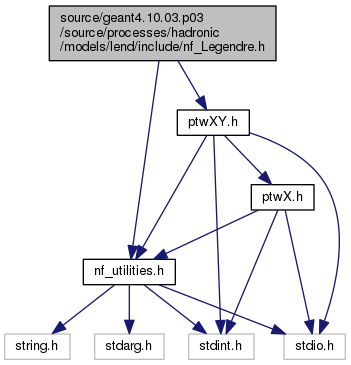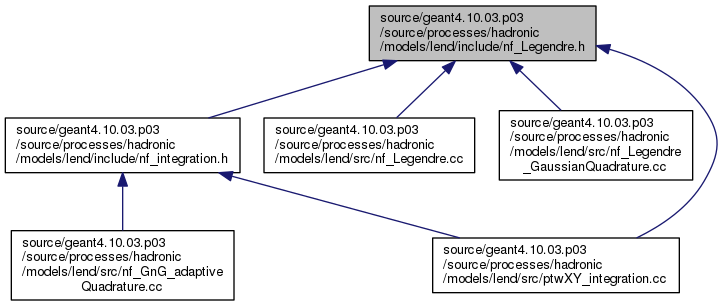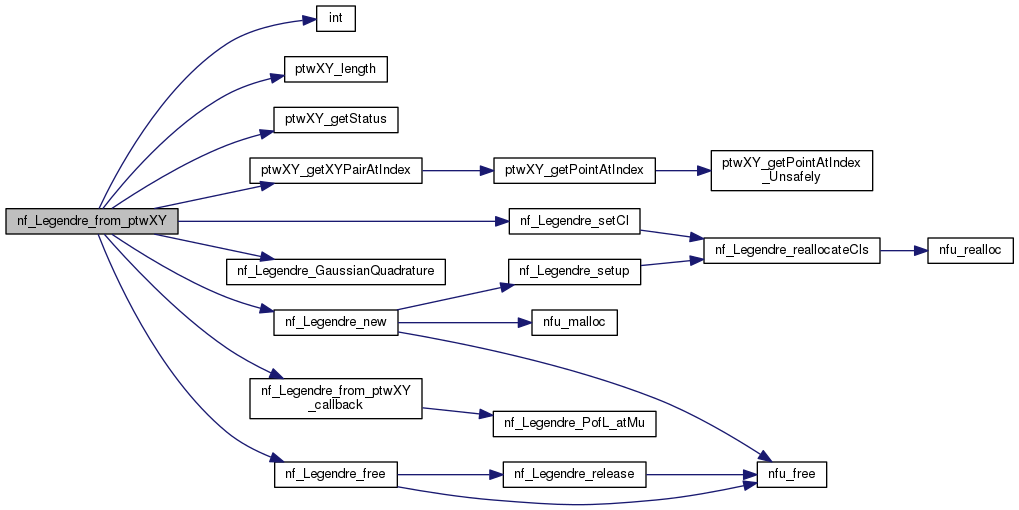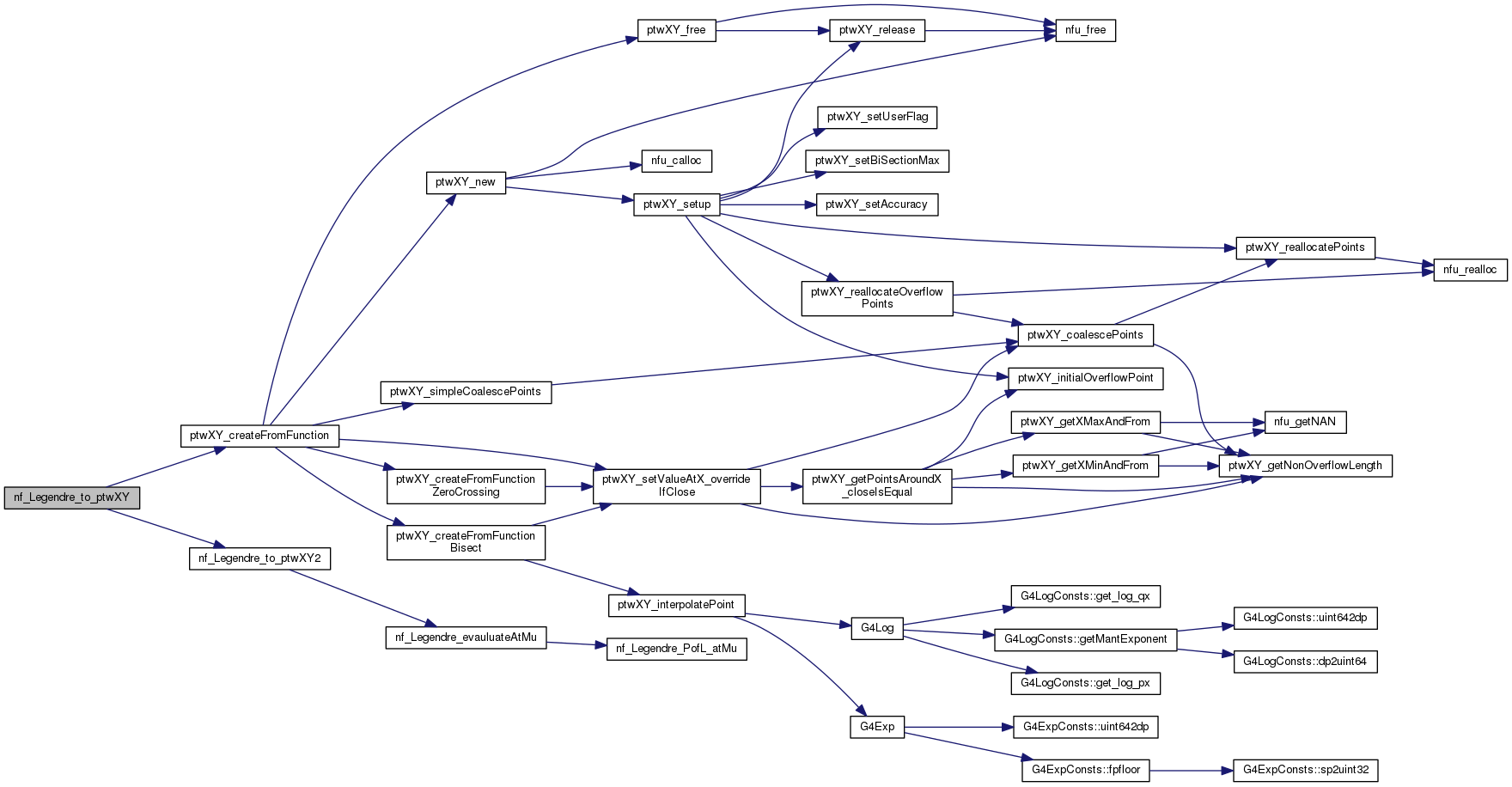|
Geant4
10.03.p03
|
|
Geant4
10.03.p03
|


Go to the source code of this file.
Classes | |
| struct | nf_Legendre_s |
Macros | |
| #define | nf_Legendre_minMaxOrder 4 |
| #define | nf_Legendre_maxMaxOrder 64 |
| #define | nf_Legendre_sizeIncrement 8 |
Typedefs | |
| typedef struct nf_Legendre_s | nf_Legendre |
| typedef nfu_status(* | nf_Legendre_GaussianQuadrature_callback )(double x, double *y, void *argList) |
| #define nf_Legendre_maxMaxOrder 64 |
Definition at line 18 of file nf_Legendre.h.
| #define nf_Legendre_minMaxOrder 4 |
Definition at line 17 of file nf_Legendre.h.
| #define nf_Legendre_sizeIncrement 8 |
Definition at line 19 of file nf_Legendre.h.
| typedef struct nf_Legendre_s nf_Legendre |
Definition at line 21 of file nf_Legendre.h.
| typedef nfu_status(* nf_Legendre_GaussianQuadrature_callback)(double x, double *y, void *argList) |
Definition at line 29 of file nf_Legendre.h.
| int nf_Legendre_allocated | ( | nf_Legendre * | Legendre | ) |
Definition at line 112 of file nf_Legendre.cc.
| nf_Legendre* nf_Legendre_clone | ( | nf_Legendre * | nfL, |
| nfu_status * | status | ||
| ) |
Definition at line 70 of file nf_Legendre.cc.

| double nf_Legendre_evauluateAtMu | ( | nf_Legendre * | nfL, |
| double | mu, | ||
| nfu_status * | status | ||
| ) |
Definition at line 160 of file nf_Legendre.cc.


| nf_Legendre* nf_Legendre_free | ( | nf_Legendre * | nfL | ) |
Definition at line 61 of file nf_Legendre.cc.


| nf_Legendre* nf_Legendre_from_ptwXY | ( | ptwXYPoints * | ptwXY, |
| int | maxOrder, | ||
| nfu_status * | status | ||
| ) |
Definition at line 250 of file nf_Legendre.cc.

| nfu_status nf_Legendre_GaussianQuadrature | ( | int | degree, |
| double | x1, | ||
| double | x2, | ||
| nf_Legendre_GaussianQuadrature_callback | func, | ||
| void * | argList, | ||
| double * | integral | ||
| ) |
Definition at line 63 of file nf_Legendre_GaussianQuadrature.cc.

| double nf_Legendre_getCl | ( | nf_Legendre * | Legendre, |
| int | l, | ||
| nfu_status * | status | ||
| ) |
Definition at line 119 of file nf_Legendre.cc.
| int nf_Legendre_maxOrder | ( | nf_Legendre * | Legendre | ) |
Definition at line 105 of file nf_Legendre.cc.
| nf_Legendre* nf_Legendre_new | ( | int | initialSize, |
| int | maxOrder, | ||
| double * | Cls, | ||
| nfu_status * | status | ||
| ) |
Definition at line 23 of file nf_Legendre.cc.


| nfu_status nf_Legendre_normalize | ( | nf_Legendre * | Legendre | ) |
Definition at line 146 of file nf_Legendre.cc.
| double nf_Legendre_PofL_atMu | ( | int | l, |
| double | mu | ||
| ) |
Definition at line 175 of file nf_Legendre.cc.

| nfu_status nf_Legendre_reallocateCls | ( | nf_Legendre * | Legendre, |
| int | size, | ||
| int | forceSmallerResize | ||
| ) |
Definition at line 77 of file nf_Legendre.cc.


| nfu_status nf_Legendre_release | ( | nf_Legendre * | nfL | ) |
Definition at line 52 of file nf_Legendre.cc.


| nfu_status nf_Legendre_setCl | ( | nf_Legendre * | Legendre, |
| int | l, | ||
| double | Cl | ||
| ) |
Definition at line 131 of file nf_Legendre.cc.


| nfu_status nf_Legendre_setup | ( | nf_Legendre * | nfL, |
| int | initialSize, | ||
| int | maxOrder | ||
| ) |
Definition at line 40 of file nf_Legendre.cc.


| ptwXYPoints* nf_Legendre_to_ptwXY | ( | nf_Legendre * | nfL, |
| double | accuracy, | ||
| int | biSectionMax, | ||
| int | checkForRoots, | ||
| nfu_status * | status | ||
| ) |
Definition at line 219 of file nf_Legendre.cc.
